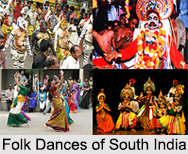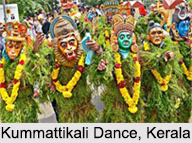 India is a land of varied culture and traditions. Our country has made great contributions in different dance forms, starting from classical, tribal to folk. Folk dances are performed for every possible occasion - to celebrate the arrival of seasons, child birth, weddings and festivals, which are a plenty. The South Indian folk dances are no different and they bring out the lifestyle and traditions of the people. Discussed elaborately below are the myriad South Indian folk dances from the states of Kerala, Karnataka, Andhra Pradesh, Telangana and Tamil Nadu and the union territory of Puducherry.
India is a land of varied culture and traditions. Our country has made great contributions in different dance forms, starting from classical, tribal to folk. Folk dances are performed for every possible occasion - to celebrate the arrival of seasons, child birth, weddings and festivals, which are a plenty. The South Indian folk dances are no different and they bring out the lifestyle and traditions of the people. Discussed elaborately below are the myriad South Indian folk dances from the states of Kerala, Karnataka, Andhra Pradesh, Telangana and Tamil Nadu and the union territory of Puducherry.Kummattikali: Performed during the festival of Onam, this South Indian folk dance called Kummattikali is a colourful mask dance. The dancers wear painted wooden masks and adorn their bodies with leaves and grass dress. The dance is performed with the musical tunes from the onavillu strings.
Arjuna Nritham: Another South Indian folk dance of Kerala which is also popularly known as Mayilpeeli Thookkam since the lower part o the costume is made with peacock feathers. Arjuna Nritham is a ritual art performed by men with a traditional lamp Nilavilakku for lighting.
Poorakkali: Primarily celebrated during the 9 days of Pooram festival in Bhagavathy temples across North Malabar of South India. The Poorakkali dancers are expected to know all the techniques and feats of Kalaripayattu, a system of physical exercise formerly famous in Kerala.
Thullal: A popular performing art South Indian folk dance, Thullalis a solo dance exposition of Kerala. There are three different types of Thullal and the classification is based upon the metre and rhythm of the songs and the costume, adornments and dance.
 Kurathiyattom: Traditionally executed in the Shiva temples, this South Indian folk dance of Kurathiyattom narrates the story of Kuravan and Kurathi, which are Lord Shiva and Goddess Parvati in disguise.
Kurathiyattom: Traditionally executed in the Shiva temples, this South Indian folk dance of Kurathiyattom narrates the story of Kuravan and Kurathi, which are Lord Shiva and Goddess Parvati in disguise.Yakshagna: A form of folk theatre from Karnataka, Yakshagna is an exemplary ancient art relating with many of the traditions and conventions of the Sanskrit theatre or drama, particularly those of the Purvarangaand the existence of a character, vidushaka. The first Yakshagana play was in Telugu and was written in the 16th century by Peda Kempa Gaudan and was called as GangaGauri Vilasam. The renaissance period dawned upon, followed by the 17th century, which was the time when the Yakshagana form developed in Karnataka, Andhra Pradesh and Tamil Nadu.
Dollu Kunitha: A major form of South Indian folk dance of Karnataka, Dollu Kunitha is performed with the beating of drums and is accompanied by singing. It is one of the ritualistic dances that are popular with the kurubas of Beereshvara Sampradaya.
Bhuta Kola: Also known as Bhootha Aradhane, this South Indian folk dance called Bhuta Kolais an ancient ritual dance performed by the Tulu</b> community to worship the spirits. It is similar to the folk dance form of Theyyam. The main idea behind this folk dance is to appease the devil and protect the environment. A procession with idols of bhoothas is taken out.
For more visit the link given below: